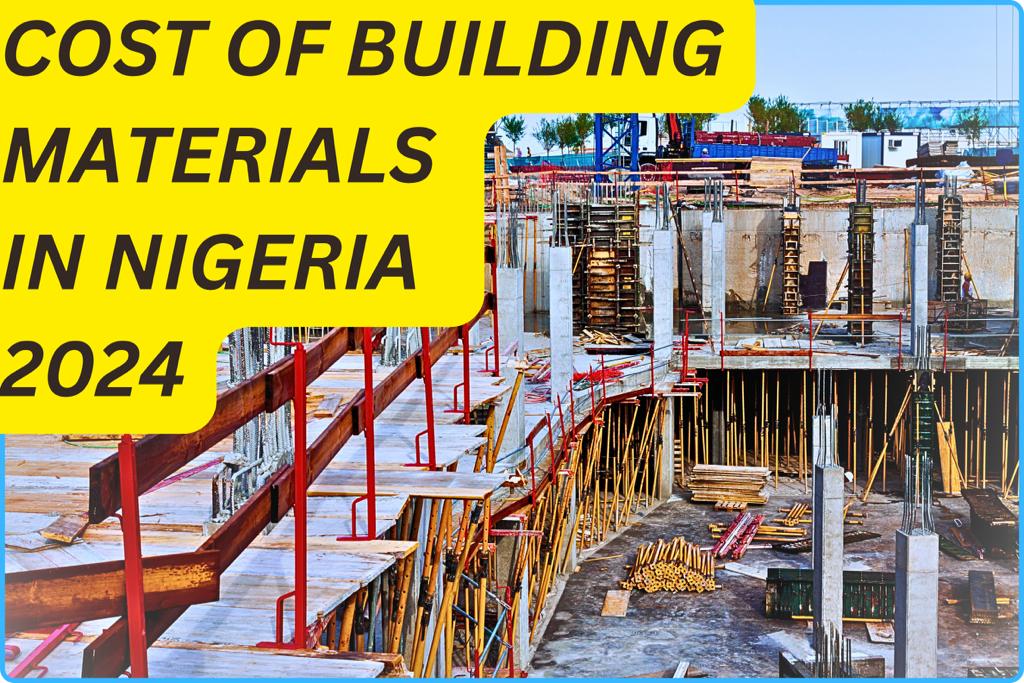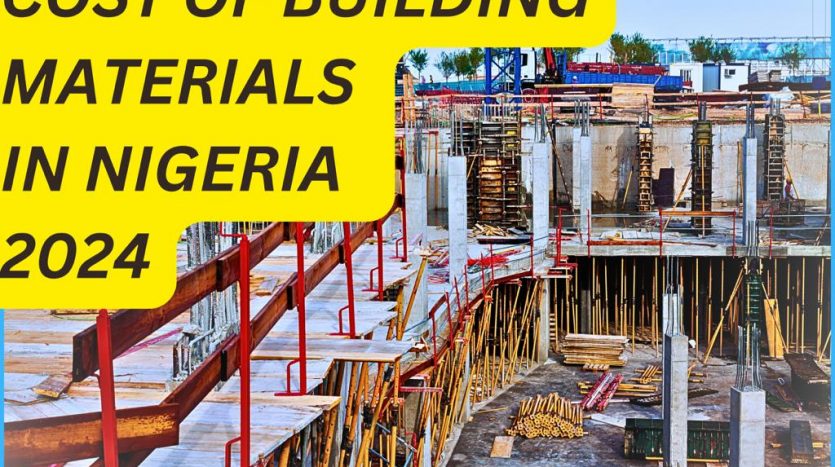The Ultimate Guide to Understanding and Budgeting for the Cost of Building Materials in Nigeria

Introduction to the Cost of Building Materials in Nigeria
Building a house or any construction project requires careful planning and budgeting. One of the most significant factors to consider is the cost of building materials. In Nigeria, the cost of building materials can vary greatly depending on various factors. This comprehensive guide aims to provide a deeper understanding of the cost of building materials in Nigeria and offer strategies for effective budgeting.
Factors Influencing the Cost of Building Materials in Nigeria
Several factors influence the cost of building materials in Nigeria. Firstly, the availability and accessibility of raw materials play a vital role. If the required materials are scarce or need to be imported, the cost can increase significantly. Additionally, fluctuations in exchange rates and international market prices can impact the cost of imported building materials.
Secondly, transportation costs also contribute to the overall cost. Nigeria’s vast geographical size and inadequate transportation infrastructure can lead to higher transportation charges, especially for remote areas. Local taxes and levies imposed by the government can further inflate the cost of building materials.
Lastly, demand and supply dynamics influence prices. During periods of high demand, such as rapid urbanization or government infrastructure projects, the cost of building materials tends to rise. Conversely, during periods of economic downturn or low demand, prices may stabilize or even decrease.
Current Trends and Projections for the Cost of Building Materials in Nigeria
To effectively budget for building projects, it is essential to stay informed about current trends and projections for the cost of building materials in Nigeria. In recent years, Nigeria has experienced significant fluctuations in building material prices due to various factors.
For instance, the COVID-19 pandemic disrupted global supply chains and led to shortages of certain building materials, resulting in price increases. Additionally, inflation, devaluation of the naira as witnessed last year 2023 and changes in government policies can all impact material costs.
To accurately project future costs, it is crucial to monitor economic indicators, such as inflation rates, exchange rates, and government policies. By staying informed about market trends and projections, builders and developers can adjust their budgets accordingly and mitigate potential cost overruns.
The Impact of the Cost of Building Materials on Housing Development in Nigeria
Furthermore, the rising cost of building materials can contribute to the increase in property prices, making homeownership unattainable for a significant portion of the population. This situation poses challenges for both individuals seeking affordable housing and the government aiming to address the housing deficit.
To address this issue, government agencies, developers, and stakeholders must collaborate to find sustainable solutions, such as promoting local manufacturing of building materials, implementing cost-saving measures, and exploring alternative construction techniques
Strategies for Budgeting and Managing the Cost of Building Materials in Nigeria
Budgeting and managing the cost of building materials require careful planning and consideration. Here are some strategies to help builders and developers effectively manage their budgets:
- Thorough Planning: Start by developing a detailed project plan that includes a comprehensive list of required materials and their estimated costs. This will provide a solid foundation for budgeting and help identify potential cost-saving opportunities.
- Comparative Cost Analysis: Before making any purchases, conduct a comparative cost analysis to identify suppliers offering competitive prices. Obtain quotes from multiple suppliers and consider factors such as quality, reputation, and delivery time alongside the cost.
- Bulk Purchasing and Negotiation: Buying materials in bulk can often result in discounts from suppliers. Negotiate with suppliers to secure the best possible prices and terms. Building strong relationships with suppliers can also lead to long-term cost benefits.
- Value Engineering: Explore value engineering options to optimize the use of building materials without compromising quality. This involves finding alternative materials or construction methods that offer cost savings while meeting project requirements.
- Regular Monitoring and Documentation: Monitor the actual costs of materials throughout the project and compare them to the budgeted amounts. Maintain accurate records to identify any deviations and adjust the budget accordingly.
By implementing these strategies, builders and developers can maximize cost savings, improve project efficiency, and ensure the successful completion of construction projects.
Popular Building Materials and Their Average Costs in Nigeria
Understanding the average costs of popular building materials in Nigeria can help builders and developers estimate and budget more accurately. Here are some commonly used building materials and their approximate costs:
- Cement: Cement is a crucial component in construction. The average cost of a bag of cement (50kg) ranges from ₦3,500 to ₦5,500, depending on the brand and location.
- Steel: Steel is commonly used in reinforcing concrete structures. The cost of steel bars (per ton) can range from ₦180,000 to ₦250,000, depending on the gauge and quality.
- Sand: Sand is a fundamental ingredient in concrete and mortar. The average cost of a tipper load of sand (20 tons) ranges from ₦25,000 to ₦45,000, depending on the location and quality.
- Bricks/Blocks: Building blocks are essential for wall construction. The average cost of a standard brick (6 inches/9 inches) ranges from ₦230 to ₦320, depending on the type and location.
- Roofing Sheets: Roofing sheets are used to cover structures. The average cost of roofing sheets per square meter ranges from ₦2,500 to ₦8,000, depending on the material and quality.
- Windows: Most windows in Nigeria are made of aluminium. It ranges from sliding windows, louvers windows, sliding windows, fixed windows. Their prices ranges from N1800 naira to N10,500 naira depending on size and quality.
- Wood: price of woods depends on the sizes ,types and quality of the wood and location of where you are buying the wood you want to use for your building. The price range is N100 naira to N9,000 naira.
- Doors: Door prices varies by country of origin, type of door, and quality materials been used. Made in Nigeria doors are more cheaper than imported doors from China, Italy or Turkey. The prices ranges from N5,500 naira to N75,000 naira per door.
- Nails: Nails comes in packs or bags, and their prices ranges from N800 naira to N7,500 naira depending on size, quality and location.
- Tiles: Flooring tiles, wall tiles comes in different sizes, quality and design. Imported tiles are more expensive than our own locally made ones. Tiles comes in packs of 12,24 or 48 depending on size. Price ranges from N2,500 naira to N15,000 naira.
- Wires: binding wires comes in rolls measured in kg. Prices ranges from N5,500 to N55,000 naira depending on quality, weight and location.
- Granite: Pillars in buildings are constructed mostly with granite and rods. Granite comes in different sizes and measured in tonnes. Prices ranges from N35,000 naira to N120,000 depending on location and sizes.
It is important to note that these prices are approximate and can vary based on factors such as location, market dynamics, and current economic conditions. Builders and developers should conduct thorough research and obtain updated pricing information from reliable sources before budgeting for specific projects.
Government Policies and Initiatives to Address the Cost of Building Materials in Nigeria
The Nigerian government recognizes the importance of addressing the cost of building materials to facilitate affordable housing and sustainable development. Several policies and initiatives have been implemented to mitigate the challenges faced by the construction industry:
- Local Content Development: The government encourages local manufacturing of building materials to reduce dependency on imports and create job opportunities within the country. This includes implementing policies that support local production and providing incentives for local manufacturers.
- Tax Incentives: The government offers tax incentives and waivers to manufacturers of building materials, lowering production costs and subsequently reducing the prices of materials.
- Infrastructure Development: The government is investing in improving transportation infrastructure to enhance accessibility and reduce transportation costs for building materials. This includes road construction, rail networks, and inland waterways development.
- Collaboration with Stakeholders: The government collaborates with industry stakeholders, such as builders, developers, and manufacturers, to identify challenges and develop solutions collectively. This cooperation ensures that policies and initiatives are aligned with industry needs and realities
These government policies and initiatives aim to create an enabling environment for affordable housing development by addressing the cost challenges faced by the construction industry.
Case Studies on Successful Budgeting for the Cost of Building Materials in Nigeria
Real-life case studies can provide valuable insights into successful budgeting for the cost of building materials in Nigeria. Here are a few examples:
Case Study 1: Affordable Housing Project: A developer planning an affordable housing project collaborated with local manufacturers to produce cost-effective building materials. This partnership resulted in significant cost savings, allowing the developer to offer affordable housing units to low-income earners.
Case Study 2: Value Engineering: A construction company implemented value engineering techniques to identify alternative materials and construction methods for a commercial building project. By utilizing cost-effective alternatives without compromising quality, they achieved substantial cost savings.
Case Study 3: Strategic Sourcing: A builder established long-term relationships with reliable suppliers and negotiated bulk purchase contracts. By securing favourable pricing and consistent delivery, they were able to stabilize material costs and effectively manage their budgets.
These case studies highlight the importance of proactive planning, collaboration, and innovative approaches to budgeting for the cost of building materials. By adopting similar strategies, builders and developers can overcome cost challenges and achieve successful outcomes.
Resources and Tools for Tracking and Estimating the Cost of Building Materials in Nigeria
Various resources and tools are available to assist builders and developers in tracking and estimating the cost of building materials in Nigeria. Here are some valuable resources:
- Industry Associations: Industry associations, such as the Nigerian Institute of Building (NIOB) and the Nigerian Institute of Quantity Surveyors (NIQS), provide valuable information, publications, and seminars on construction costs and trends.
- Construction Cost Estimating Software: Utilizing construction cost estimating software can streamline the process of estimating and tracking material costs. These software solutions offer comprehensive databases of material prices, allowing for accurate estimates and budgeting.
- Market Research Reports: Market research reports, published by reputable firms,provide in-depth analysis of building material prices, market trends, and projections. These reports offer valuable insights into the current and future cost landscape.
- Online Platforms: Online platforms dedicated to the construction industry, such as construction marketplaces and forums, often provide up-to-date information and discussions on material prices and trends.
By leveraging these resources and tools, builders and developers can stay informed and make informed decisions when budgeting for the cost of building materials
Conclusion and Final Thoughts on Budgeting for the Cost of Building Materials in Nigeria
The cost of building materials in Nigeria is influenced by various factors, including availability, transportation costs, and demand dynamics. Understanding these factors and staying informed about market trends and projections is crucial for effective budgeting
The impact of building material costs on housing development in Nigeria necessitates collaborative efforts between the government, industry stakeholders, and developers to find sustainable solutions. Strategies such as thorough planning, value engineering, and strategic sourcing can help manage and mitigate cost challenges.
By utilizing available resources and tools, builders and developers can accurately estimate material costs and make informed decisions. Ultimately, effective budgeting for the cost of building materials is crucial for the successful completion of construction projects and the provision of affordable housing in Nigeria.

